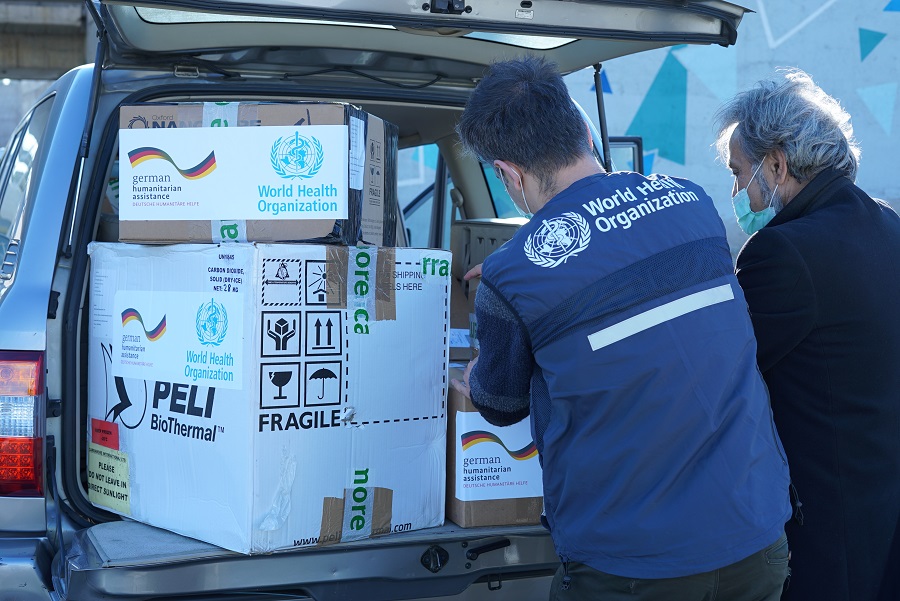 Credit: WHO/Islamic Republic of Iran
Credit: WHO/Islamic Republic of Iran
Thursday, 6 January 2021 – In order to help strengthen the screening capacity of genetic variants causing COVID-19 in the Islamic Republic of Iran, the World Health Organization (WHO) has donated 6 sets of advanced genomic sequencing equipment with next-generation sequencing technology through financial support from the Federal Republic of Germany.
The donation, procured through the German Federal Foreign Office, honours a request by the Ministry of Health and Medical Education to help boost the existing testing and screening capacities, particularly the fast-circulating variant of concern ‘Omicron’. The advanced genomic sequencing machines will equip 3 diagnostic and reference centres in Islamic Republic of Iran, namely the National Influenza Reference Laboratory, the Pasteur Institute of Tehran, and the Virology Research Center of Masih Daneshvari Hospital in Tehran.
Testing, which results in identification of genetic variations of SARS-COV-2 virus, is of great importance in containing the pandemic as it identifies viral characteristics of potential spread, pathogenicity and vaccine resistance. Its importance has been further intensified as Iranian health authorities plan ahead for a potential peak caused by Omicron across the country.
Advanced genomic sequencing machines equipped with next-generation sequencing technology are used to identify different variants and strains of different microbes, including the SARS-COV-2 virus causing COVID-19, and offer ultra-high throughput, scalability and speed.
Their use will be highly instrumental at the Pasteur Institute of Tehran, the leader of the national COVID-19 laboratory network and a centre for advanced research and innovative programmes in basic and applied medical sciences and production of biopharmaceuticals, including the recently developed PastoCovac recombinant COVID-19 vaccine. The equipment will also highly benefit the National Influenza Reference Laboratory that serves as the key point of contact between WHO and Islamic Republic of Iran in all matters relating to epidemiological and virological aspects of influenza and SARS-COV-2, as well as Masih Daneshvari Hospital, the country’s reference centre for all pulmonary and respiratory diseases, including COVID-19, since the beginning of the pandemic.
 Credit: WHO/Islamic Republic of Iran
Credit: WHO/Islamic Republic of Iran
Thursday, 6 January 2021 – In order to help strengthen the screening capacity of genetic variants causing COVID-19 in the Islamic Republic of Iran, the World Health Organization (WHO) has donated 6 sets of advanced genomic sequencing equipment with next-generation sequencing technology through financial support from the Federal Republic of Germany.
The donation, procured through the German Federal Foreign Office, honours a request by the Ministry of Health and Medical Education to help boost the existing testing and screening capacities, particularly the fast-circulating variant of concern ‘Omicron’. The advanced genomic sequencing machines will equip 3 diagnostic and reference centres in Islamic Republic of Iran, namely the National Influenza Reference Laboratory, the Pasteur Institute of Tehran, and the Virology Research Center of Masih Daneshvari Hospital in Tehran.
Testing, which results in identification of genetic variations of SARS-COV-2 virus, is of great importance in containing the pandemic as it identifies viral characteristics of potential spread, pathogenicity and vaccine resistance. Its importance has been further intensified as Iranian health authorities plan ahead for a potential peak caused by Omicron across the country.
Advanced genomic sequencing machines equipped with next-generation sequencing technology are used to identify different variants and strains of different microbes, including the SARS-COV-2 virus causing COVID-19, and offer ultra-high throughput, scalability and speed.
Their use will be highly instrumental at the Pasteur Institute of Tehran, the leader of the national COVID-19 laboratory network and a centre for advanced research and innovative programmes in basic and applied medical sciences and production of biopharmaceuticals, including the recently developed PastoCovac recombinant COVID-19 vaccine. The equipment will also highly benefit the National Influenza Reference Laboratory that serves as the key point of contact between WHO and Islamic Republic of Iran in all matters relating to epidemiological and virological aspects of influenza and SARS-COV-2, as well as Masih Daneshvari Hospital, the country’s reference centre for all pulmonary and respiratory diseases, including COVID-19, since the beginning of the pandemic.
 Credit: WHO/Islamic Republic of Iran
Credit: WHO/Islamic Republic of Iran








